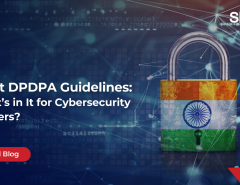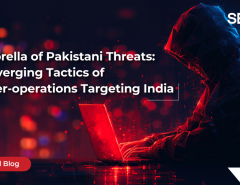If there is one type of organization which is a favorite of cyber criminals worldwide, it is government institutions. The reasons for that are obvious: most governments, whether at the state or the federal level, are massive behemoths with huge information making them a lucrative target for hackers. From data breaches within India’s Aadhar program to attacks on Australian government attacks to a $81-million heist at Bangladesh Bank, the country’s central bank, there is no dearth of attacks on government bodies. Here are some of the reasons why government institutions are vulnerable to cyber attacks:
- Most government bodies place IT and cybersecurity very low in the pecking order of priorities. The knowledge about malware, vulnerabilities and breaches is less which means their cybersecurity defence is almost zero.
- Cyber defense is an agile, ever-changing field, which is the complete opposite of a typical government organization. They can be notoriously slow and bureaucratic, meaning they are completely unsuited to the art of proper cybersecurity.
- Government departments often work in silos which mean there is very less information sharing between them. The channels of communication are slow and, at times, nonexistent. Unfortunately, a proper cybersecurity policy requires seamless communication between all departments allowing for better threat response and detection, which is often missing from government departments.
- The power structures present in government bodies often get in the way of cybersecurity defense. A cybersecurity department has to work independently for the fullest benefit but that is often not possible in a government setup.
- Around the world, government bodies find them cash-strapped and have to invest only in high-priority projects. Unfortunately, most government bodies do not consider cybersecurity as a high-priority project, neglecting it to their own detriment.
Seqrite understands that government bodies require special care – they hold some of the most sensitive data on the planet and yet, remain some of the most insecure departments for hackers. Hence, by offering vendor-agonistic, holistic and comprehensive consulting services, Seqrite Services helps organizations proactively protect IT assets and respond to cybersecurity threats, comply with regulatory and compliance frameworks. Seqrite Services delivers cybersecurity services and solutions to Corporates, PSUs, Government and Law Enforcement agencies across the globe. A wide range of Managed Security Services including Cyber Audit and Cyber Forensic, Security Consulting and Security Operations Centre (SoC) are offered to Enterprises and Government organizations.
Quick Heal, the parent company of Seqrite, has actively partnered the Government of India in various initiatives for fighting cybercrimes. In collaboration with “Cyber Swachhta Kendra” under the Indian Computer Emergency Response Team (CERT-In), Ministry of Electronics & IT, Quick Heal has developed a free Bot Removal Tool that helps users remove botnet infection from their computer. The indigenously developed tool will continuously monitor the threat landscape for new bots and prevent them from damaging the user’s device by creating an antidote for every bot. It also has a mechanism to automatically detect botnets and analyse the behavior of a malware to find out if it is new or a modified version of an existing malware.
This tool helps end users detect and remove any botnet infection from the computer and can be run without any antivirus program, on all Windows operating systems.
Quick Heal also works closely with CERT-In to address other increasing and complex problems associated with computer and cybersecurity. Quick Heal Academy, a division of Quick Heal Technologies and a premier institute engaged in supporting and securing cyberspace, has also played a part in this role by collaborating with the Directorate of Information Technology, Government of Maharashtra for creating cybersecurity awareness.
As an IT security partner for your business, Seqrite provides comprehensive security from advanced cyber threats. To know more




